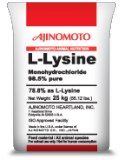Lysine is the first-limiting amino acid in corn-soybean diets for swine and second limiting, after Methionine, in poultry. Ajinomoto Heartland’s L-Lysine HCl [Feed Grade] contains a minimum of 98.5% L-Lysine monohydrochloride (on a dry matter basis).
Corn, which comprises the largest portion of monogastric diets, is low in lysine. In order to meet the amino acid requirements of swine and poultry, high-protein ingredients such as soybean meal and animal by-product meals are blended with corn. In the past, excess protein was fed to meet the requirement of the first limiting amino acid. With the commercialization of L-Lysine, nutritionists have more flexibility with utilizing nontraditional feed ingredients, which may improve profitability without loss of feed quality. As a result, the lysine requirement of livestock can be met in a cost-effective manner by reducing the amount of costly, high-protein ingredients that were once fed.
A large number of studies have demonstrated that today’s leaner, faster growing swine genotypes respond to higher levels of dietary Lysine when compared to the same pigs fed average type diets. This translates into leaner pigs, improved feed efficiency, improved carcass yield and better margins over feed costs. Similar studies with poultry have shown an improvement in breast meat yield.

